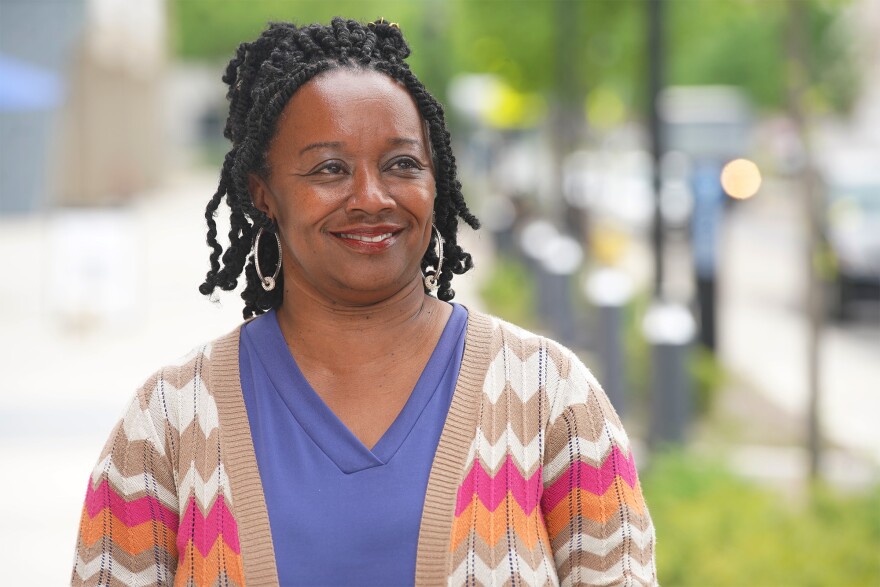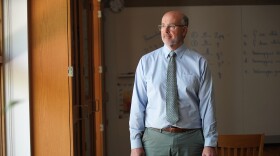Akron’s Black community has been plagued with tragedy the past three years, with a higher rate of pandemic deaths, a rise in gun violence and opioid deaths spiking. And almost a year after the shooting death of Jayland Walker, the community is still trying to heal from the loss.
In Ohio, the suicide rate among Black men has climbed from 10% in 2014 to nearly 18% in 2021, according to the Ohio Department of Health. In Summit County last year, the rate was almost 32%, according to the Summit County Suicide Prevention Coalition.
Kemp Boyd said he’s concerned.
“Last year was the highest rate of African American male suicides in our county, right? And then when you measure that, the overdoses were even higher," Boyd said. "So when you measure that versus the white counterpart, man that’s something.”
Barriers to mental health services
Boyd leads the Christian based community organization Love Akron. These numbers and the other tragedies of the past few years are causing calls for action about mental health in Akron.
“But now we’re in a place to where we have to begin to discuss this a little bit more, be more vulnerable to say, ‘Hey, you know what, yeah I’m bothered by what I see going on,'" Boyd said. "And this is even why we have to start asking people the question, ‘How are you?,’ not, ‘How are you doing?,’ but, ‘How are you?’”
But getting to that place of vulnerability and accessing mental health services isn’t always easy.
“You know, there’s barriers," Boyd said. "There’s barriers to get sometimes the services and the help that you need, whether it be transportation, insurance.”
Not only are there barriers to accessing these services, there’s also a stigma, especially surrounding Black men going to therapy. This is a struggle Boyd has faced.
"How do we begin to galvanize deeper conversations with men?," Boyd asked.
Eric King is a Black male therapist and president of Mental and Emotional Wellness Centers of Ohio (MEWCO). Most of the therapists in his practice are people of color in a profession that’s 72% white nationally.
“In reality, what we’re really dealing with, with men especially Black men, is dealing with dignity, helping them restore their dignity," King said, "because it’s not fun out there for Black males.”
Discussing mental health with kids
To attack this stigma, Love Akron’s Kemp Boyd and other community organizations in the city are working together to open up conversations about mental health. One of Boyd’s efforts is to start these conversations with kids, who often are struggling with their own mental health issues. A study from JAMA found that between 1991 and 2019, Black adolescents had the largest increase in suicide attempts. Data from the AAKOMA Project showed that in 2022, 52.1% of Black youth experienced mild to severe anxiety, and 53.3% of Black youth experienced moderate to severe depression. 22.6% of Black youth reported seeking treatment for mental health, while 47.9% said they don't need to see a mental health professional.
Love Akron and other organizations have partnered with Akron Public Schools to host an event Friday evening providing a safe space for conversations about mental health, including the impact Jayland Walker’s killing may have had on students. A study from Sage Journals found racism and violence against the Black community contributes to increased risk of depression and anxiety. Dreama Mason Whitfield works with students and mental health specialists in Akron Public Schools and has been working with Boyd on this event.

“And they were wanting a way to properly and appropriately recognize Jayland Walker, the verdict around him," Whitfield said, "and they also wanted to find a way to socially advocate in the right way.”
Whitfield sees these conversations becoming less stigmatized with kids than it is with adults. She works with student leaders at all eight high schools in the district to choose a challenge to work on at their school.
“Four out of the eight schools chose mental health, so I think that it is becoming less of a stigma," Whitfield said. "Because people are saying, ‘Hey, I need some help. Not only do I need help, but my brother needs help. My sister needs help.’”
Aaron Sharpley, a Black male therapist with MEWCO, cautioned sometimes these conversations begin and end with the students.
"Then the conversation is not being had enough with other adults, even parents," Sharpley said. "I actually had a fifth grader in my office today, and he was telling me that he trusted me with some information. But he wasn't sure if he could trust a therapist."
Sharpley said this sort of exchange illustrates how kids can pick up adult's distrust of mental health services.
This year, Akron schools launched a program to train high school students to be able to respond to their peer’s mental health concerns.
“Because sometimes students feel like, ‘I want to talk to a peer. I’m not very comfortable talking to an adult, but if I can talk to one of my peers …'" Whitfield explained. "And their peers are trained to say, ‘Hey, this is what’s happening with you,’ and if they feel like it’s something more serious, they can refer that student to a trusted adult.”
Sharpley thinks sometimes kids are more likely to talk about their problems with their peers.
“Trust is a big issue, and I think sometimes kids have had that trust broken," Sharpley said. "And therefore they will be more comfortable sharing with their peers versus with other adults.”
Part of the work Boyd is aiming to do includes making mental health resources and conversations about mental health available at trusted places like school.
"If we can create more of that third space that is more after school, and now we can open up the doors, which I think Akron Public Schools is going to do a great job of helping to allow some of that to happen," Boyd said.
Boyd hopes opening schools to families will allow them to reach parents and other community members.
"This concept of not only just focusing on young people: how do we focus on their families as well who are struggling and also have some of these mental health concerns or needs?" Boyd said.
And Boyd said having these events at schools is knocking down barriers.
"Now you're welcoming the whole community into that process with them, versus saying, 'Hey, we need you to come to us to get you the help that you need,'" Boyd said. "No, now we can meet you at the school."
Whitfield is hopeful the work they’re doing with students will grow into something bigger.

“It does not only stop with our students, but then it bleeds into their families," Whitfield said. "And when it bleeds into our families it bleeds into our community as a whole.”
Nontraditional mental health services
Approaching adults about mental health services in a culturally competent way is another issue Boyd has been tackling with Love Akron. The organization runs a program called the Grief Recovery Method, which is sponsored by the County of Summit Alcohol, Drug Addiction and Mental Health Services Board. Participants attend sessions for eight weeks that help them overcome grief, whether that's the loss of a loved one, financial challenges, a new job or a health diagnosis. Boyd has seen great success in adults participating in this program.
"With adults there was this stigma around seeing a therapist or a counselor," Boyd said. "And so we were very intentional about saying this is not therapy, because really it isn't."
Instead, participants speak about grief with each other and a Grief Recovery Method specialist, a community member trained in the program. Adults are more willing to talk about their feelings and struggles without the label of therapy, Boyd has found, and this can open the door to accessing mental health resources in the future.
"Through that what you're helping to do is hopefully limit some of the stigma that is associated with the mental health challenge," Boyd said.
Sharpley has experience connecting with Black men about mental health in nontraditional ways.
"I've been in bonfires, so you get a whole bunch of men together. And they start talking, and there'll be someone like me that has skills and experience," Sharpley explained. "And we will lead these discussions, but we really approach it from that kind of vehicle. And it gets people talking a little more comfortably."
These events and programs can help break down the stigma surrounding mental health, Sharpley said.
"You notice that everybody is struggling with something, that you're actually not alone in suffering and you don't have to suffer in silence alone," Sharpley said. "And I think you can kind of see that in those informal settings a little easier."
Talking about feelings in an informal way can be an entryway to participating in formal therapy in the future, Sharpley said.
Churches and religious leaders are also taking a bigger role in talking with their constituents about mental health, Boyd said.
"If your pastor is talking to you about mental health and they're saying it's OK for us to talk about it, then that's going to help eliminate a little bit of that, if you will, maybe nervousness or uncomfortableness of leaning into it a little bit more," Boyd said, "so really I think this is a great role our pastors can play within our city."
For community organizations to do effective work in the mental health space, they need to be intentional, Dorian Mahulawde, another Black male therapist at MEWCO, warned.
"If community organizations want to be a part of change, they have to go out and intentionally say, 'Hey, we created this space specifically for Black men. How can we support you? How can we help you? And how can it be space emotionally?,'" Mahulawde said, adding that it would be best if these spaces are created for the Black community by the Black community.
More work to do
And there’s still some barriers that need to come down to make mental health services accessible to Black communities, therapist Eric King said.
“I think my hope will I guess, my hope will get layered or ramp up when I see more representation in the schools, because, let’s be perfectly candid, the representation that are running these classes or running these mental health classes are white women," King said. "They’re not Black males.”
The importance of more Black therapists in the community is not lost on Whitfield and Boyd.

“Having African American therapists right in your community that you can go see, it takes away some of the stigma," Whitfield said, "because you’re talking to someone who looks like you, that probably lives in your community.”
Boyd knows that there’s more systemic work that needs to be done, including the need for more Black therapists. But he’s energized by the community coming together to have these conversations about mental health and believes they’re having a positive impact.
"The more, I think, tools we can get in our tool box is going to be healthy for us as we continue to do this work, and I think that was so important," Boyd said. "And even the people we have partnering with us that we're bringing, they're all resources in our community that want to if you will add some help to our young people in what's happening, what's going on."
And Whitfield said her students are eager to do this.
"What I have been hearing is they want to learn how to express their emotions. They want to learn how to use their words," Whitfield said. "They want to have safe spaces to go to, so they can talk to people who understand, and they want to have that confidentiality to say what's on their minds and what they've been feeling."
If you are someone you know is experiencing a mental health crisis, call the National Suicide Prevention Lifeline at 988.






